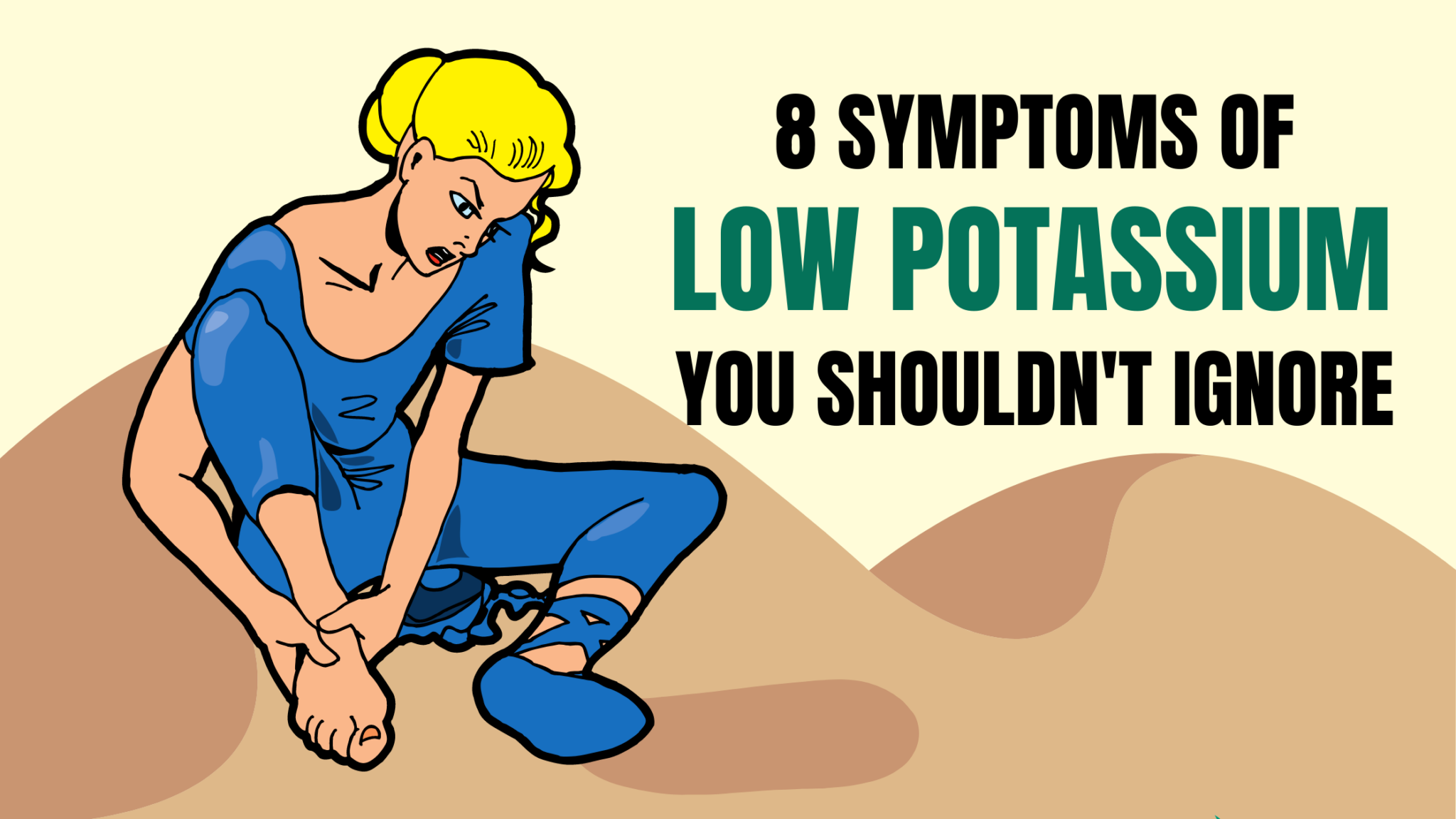8 Symptoms of Low Potassium You Shouldn’t Ignore
Potassium plays a vital function in maintaining your body’s overall function. It’s an essential mineral that helps control muscle contractions, maintain normal blood pressure, and regulate your heart rhythm. When your potassium levels drop too low—a condition medically known as hypokalemia—your body will start sending out warning signals. Scroll through to discover the common symptoms that indicate you might be running low on potassium.

1. Muscle Weakness Can Be a Clear Sign of Low Potassium Levels
One of the first symptoms you might notice is muscle weakness. Potassium is vital for muscle function because it helps transmit signals from your brain to your muscles. When your potassium levels drop, these signals become weaker, resulting in muscles that feel unusually tired or weak.
According to research low potassium interferes with the communication between your muscles and nerves, which leads to reduced muscle strength. Consequently, everyday activities, like lifting objects, cleaning your home or climbing stairs, may suddenly seem more strenuous.
2. You Might Experience Muscle Cramps and Spasms
Muscle cramps and spasms are another warning sign of low potassium. These cramps can strike without any warning, usually at night, and might feel like a sudden tightening or knotting sensation in your muscles.
In fact, potassium helps your muscles relax after they contract. When levels are too low, muscles tend to stay in a contracted state, causing cramps or spasms. As we explain in our blog, potassium works closely with other electrolytes, like calcium and magnesium, to regulate muscle contractions. So, if you’re experiencing frequent cramping, it might be worth checking your potassium intake.
3. Fatigue and Feeling Weak All the Time Can Be a Red Flag
Feeling constantly exhausted, even after a good night’s sleep, can be a sign of low potassium levels. That’s because potassium is a key player in generating energy within your cells. When there’s not enough potassium available, your cells struggle to function efficiently, making you feel drained.
The Clinical Journal of the American Society of Nephrology notes that potassium is critical for cellular processes, including converting food into energy. Low potassium levels slow down this process, which leads to fatigue, sluggishness, and an overall lack of energy. If you’re always tired, despite resting well, it might be time to check your potassium status.
4. Heart Palpitations and an Irregular Heartbeat Can Occur
Low potassium can have a serious impact on your heart health. It can lead to heart palpitations—those sudden, fluttering, or pounding sensations in your chest. In severe cases, hypokalemia can even cause arrhythmias, or an irregular heartbeat.
Potassium helps regulate your heart’s electrical impulses, so when it’s in short supply, your heart may struggle to beat in a regular rhythm. If you notice frequent or severe palpitations, you should promptly contact your doctor since potassium levels play a crucial role in heart function.
5. Tingling and Numbness in Your Extremities Could Be a Symptom
Tingling or numbness, especially in your hands, feet, or legs, could be a sign that your potassium levels are off. This happens because potassium is necessary for proper nerve function. When levels drop, your nerves can’t send signals as efficiently, leading to sensations like tingling, prickling, or numbness.
Cleveland Clinic states that this symptom is common among those with low potassium and may even extend to muscle twitching in certain cases. While occasional tingling might not seem alarming, frequent occurrences should prompt you to evaluate your potassium intake.
6. Digestive Issues Like Constipation or Bloating Might Arise
Believe it or not, low potassium can even impact your digestive system. That’s because potassium plays a role in the muscle contractions that move food through your digestive tract. When levels are low, these contractions slow down, leading to symptoms like constipation, bloating, and abdominal discomfort.
Many scientific studies have proven that a potassium deficiency can disrupt the smooth muscle contractions in your intestines, resulting in sluggish digestion. If you’re experiencing regular digestive issues, it might be linked to your potassium intake.
7. High Blood Pressure Can Be Linked to Low Potassium Levels
If your blood pressure is higher than usual, it could be a sign of low potassium. Potassium helps balance the effects of sodium in your body, which is vital for maintaining healthy blood pressure levels. When your potassium levels drop, sodium’s effects become more pronounced, causing your blood pressure to rise.
The American Heart Association emphasizes that getting enough potassium can help manage high blood pressure, making it crucial to monitor your intake if you’ve been diagnosed with hypertension.
8. Breathing Difficulties May Develop Due to Low Potassium
Breathing difficulties can be a more serious sign of hypokalemia. Potassium plays an important role in regulating the function of your lungs and diaphragm—the main muscle involved in breathing. When potassium levels are too low, your diaphragm may not function properly, leading to shortness of breath or even respiratory distress.
According to a StatPearls review suggests that severe potassium deficiency can weaken the muscles needed for breathing, which can be life-threatening if left untreated. So, if you experience sudden breathing problems, it’s essential to seek medical attention right away.
When Should You See a Doctor About Low Potassium?
If you suspect you have low potassium levels, make an appointment with your doctor, especially if you’re experiencing any of the symptoms mentioned above. They can perform a blood test to check your potassium levels and recommend treatment options, such as dietary changes or supplements.
In severe cases, your doctor might recommend potassium injections or intravenous (IV) potassium to restore levels quickly. Keep in mind that self-diagnosing or treating a potassium deficiency on your own is not advisable, as too much potassium can also be harmful.
What Foods Are Rich in Potassium?
If you’re looking to boost your potassium levels, consider incorporating more potassium-rich foods into your diet, such as:
- Bananas
- Avocados
- Sweet potatoes
- Spinach
- Yogurt
- Beans
- Salmon
- Tomatoes
The National Institutes of Health (NIH) recommends adults get around 2,600 to 3,400 mg of potassium daily, depending on age, gender, and health status. Including these foods in your meals can help you maintain healthy potassium levels and prevent symptoms of deficiency.
The Takeaway
Potassium is an essential mineral that supports your muscles, heart, nerves, and overall well-being. Experiencing symptoms like muscle cramps, fatigue, heart palpitations, or digestive issues could be a sign that your body’s potassium levels are too low. See your doctor if you notice any of these symptoms, and remember that maintaining a balanced diet is the best way to keep your potassium levels in check.






